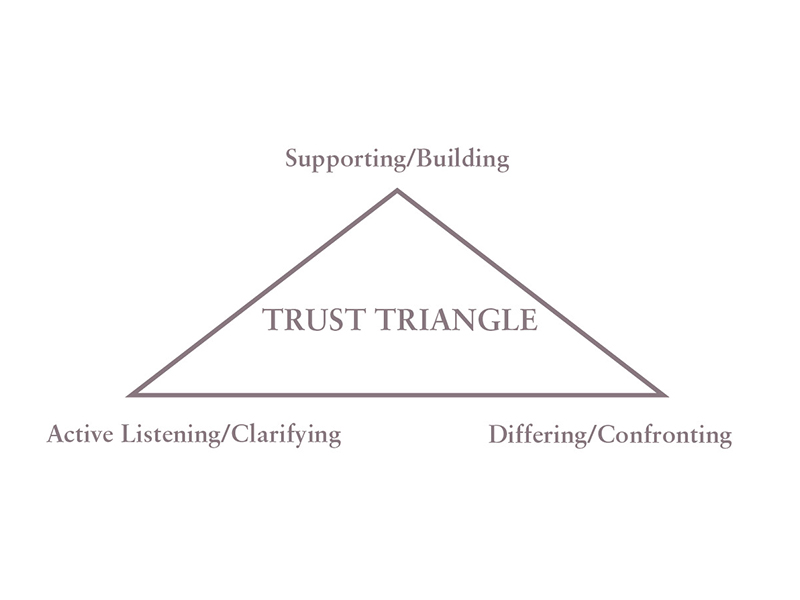Conflict delivers us to the Edge of a transformation. We have no need to disagree, argue, or fight with others whose understanding mirrors our own. If we avoid conflict we tend to make friends with people, and join organizations, that have our same values. In effect, we surround ourselves with familiar territory. If we disagree it involves us in questioning, reflection, and new understandings. We might end up having to change what we have believed to be true up to this point. And that might lead to a personal transformation.
Conflicts feel hot, hard to handle, win/lose. Some of us refuse to engage in anything remotely like a conflict. Many even resist the word conflict. For example:
- “I don’t do conflict. If people want to argue with me, I just cut them out of my life.”
- “Employee conflicts will not be tolerated.”
- “Please call the class Resolving Disagreements instead of Conflict Management.”
Current definitions support this position. Conflict is:
- a serious disagreement or argument, typically a protracted one.
- to be incompatible or at variance; clash.
University Associates defines it as a process that begins when one of the people involved believes that the other will frustrate their needs or concerns.
What is missing from these definitions?
Most current “conflict” definitions lack essential information. The word’s original formations are:
- from Latin conflict- ‘struck together, fought’,
- from the verb confligere, from con- ‘together’ + fligere ‘to strike’;
- the noun is via Latin conflictus ‘ – a contest’.
I think this language moves us a little closer to what’s missing. We strike flint and another hard rock or steel to create light and warmth. In a contest of opposing truths, striking together creates light, brings change.

Let’s define a conflict as “An opportunity for people who disagree to engage with each other and explore the edge or next stage of their development.” This definition encourages us – there is something to be gained in the contest.
But I don’t want to …
If we have negative experiences with conflict we tend to avoid, suppress, smooth over, “wait for emotions to cool down”, deny it’s happening, ignore early stages. Or we stop any possibility of working through the disagreement by exploding, shouting, making people cower in fear. These tactics manage very few conflicts, and very few just “go away”.
If we have positive experiences with conflict we tend to engage, confront, collaborate, negotiate, accept difference, manage the situation. But we have to risk our own position to do so. That is what makes conflict an Edge. If you agreed, it wouldn’t be conflict, it wouldn’t challenge what you know, ask you to risk exploring what you don’t know. If you step off the Edge and engage in the conflict, count on change.
Because conflict is a transformer I’ve found a useful attitude is to say “Ah, hah. Something needs changing. I wonder what it is?” and to ENGAGE. And – besides a positive attitude towards conflict – it is also important to learn new skills and manners so engagements are successful.

The Hook
It may help to imagine that you and I and others walk around unconsciously trailing an invisible fishing line with one or two hooks. Your hook catches on mine or another’s trailing hook. Willing or not, we are out there in the world looking for each other, hoping to ENGAGE, and explore our next necessary development.
It might be a fast conflict: you and a clerk get in a shouting match – how do you resolve it? It might be very slow, like the 20- year conflict we’ll explore in an upcoming blog.
Either way, you are hooked. You and the other person are flint and steel, sparking a new light on your situations. If you were not hooked you might find the person or incident amusing or at least approach the situation from neutrality.
The Edge: Root and Web
Conflict places opposing people, groups, ideas in the same space and time. The choice is to avoid or engage. Making the choice is like standing at the edge of a cliff, knowing that to step off puts you in free-fall with no guarantee of outcome.
If you are working with the Hero/Heroine’s information on my website, choosing to Engage is the Gate In on a Journey, and a Road of Trials is just ahead. Working through a conflict is rarely an easy or light-hearted process. The statement “We have to choose to just disagree” is a denial of your Hero/Heroine’s Call to transformation. Engaging in the conflict sets you on a journey of exploration and potential transformation.
The Root and Web of Conflict
Every conflict begins somewhere: that status nascendi is the Root. Something happens, very small to very large, but it creates a break between you and the Other. There are ways to dig out the Root, to discover the reason why this person or situation has created a conflict in your life. We’ll explore them in future blogs.
And every conflict affects the Web of life in which you are living. That web includes the people of your sociometry, your web of relationships. It includes the web of relationships on the other side of the conflict. And it creates a tear in the fabric of the whole, an unweaving of the threads of connection. There are ways to mend the Web, but first comes understanding. In future blogs we will learn how to mend a Web.
To manage a conflict discover the Root, and know how wide the Web. But first you have to choose to Engage and step off the Edge of what you know and who you are.
Personal Exploring:
- Do you welcome or resist engagement in a conflict?
- Do you remember how you developed your attitude towards conflict?
- How does your attitude towards conflict serve you? Harm you?
Let me know how these questions are useful to you. In the upcoming blogs we will be exploring the Root, Web and Edge of Conflict.
EDGE: Root & Web
Exploring Conflict as Transformer.




